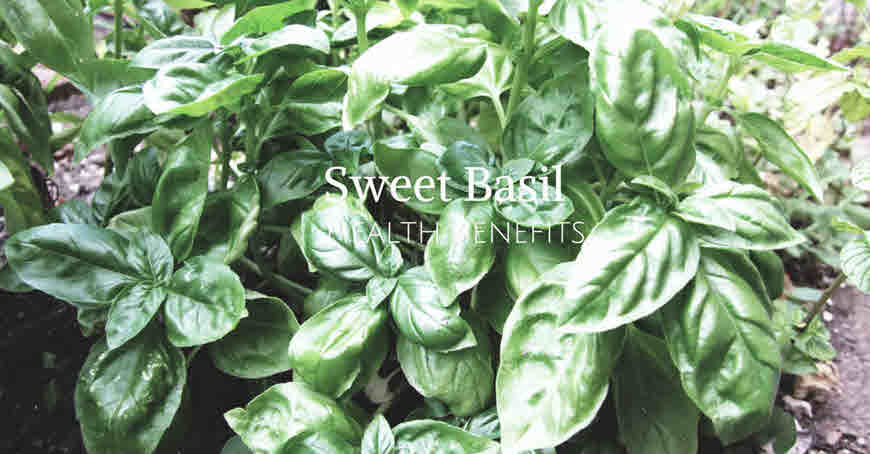Sweet basil is native to India and Iran and is widely grown as a kitchen herb. It is found growing wild in tropical and subtropical regions of the world. The leaves of the plant are sweet, aromatic, warming and pungent. They are used as flavouring agent and in the preparation of salads. Sweet basil is a medicinal herb and its leaves and seeds are used for curing variety of diseases. It is antibacterial, anti-spasmodic, antiviral, carminative and nervine. The seeds are used to reduce body heat and nervous debility. For this purpose they are soaked in water overnight and consumed in the morning. The leaves are effective remedy for the digestive and respiratory disorders.

Scientific Classification
The botanical name of Sweet Basil is Ocimum basilicum and it belongs to the family Lamiacaea. The synonyms of species are O. caryophyllatum Roxb.;O. minimum Linn.;and O. pilosum Willd.
The Genus name, Ocimum is derived from the Greek word ‘ozo’ (means to smell), due to the strong odours of the species within the genus. The species name may have been derived from the Greek word basileus, or king. Sweet basil is also referred as the king of herbs.
Its taxonomical classification is as given below:-
- KINGDOM Plantae
- PHYLUM Magnoliophyta
- CLASS Magnoliopsida
- ORDER Lamiales
- FAMILY Lamiacaea
- GENUS Ocimum
- SPECIES O. basilicum
PLANT DESCRIPTION:
Perennial in tropical climates, and is planted as an annual in temperate regions;plant reaches up to one-two feet height;shiny aromatic, large green leaves, measuring around 2 inches in length;Small white flowers grow in spikes at the ends of the stems.
The plant propagates through seeds which are sown in late spring, at a minimum temperature of 600 F (150C). The Germination is fast at higher temperatures. The plant prefers full sun and average water. The plant is highly frost sensitive and long cold spell can kill the plant.
Vernacular names
- AYURVEDIC: Barbari, Tuvari, Tungi, Kharpushpa, Ajgandhikaa, Babui Tulsi, Bisva Tulsi
- SIDDHA: Thiruneetru Pachilai
- UNANI: Faranjmishk
- FOLK NAME: Van Tulsi
- ENGLISH: Sweet basil and Harry Bail
- PUNJABI: Baburi ORIYA: Dhala-tulsi MALAYALAM: Tiru-nitru SINDHI: Sabajhi
- Part used: leaf and seeds
Medicinal uses of Sweet Basil/Basil herb
Sweet basil is a common medicinal herb and used in the treatment of various diseases from time immemorial. The leaves of the plant contain methylchaylcol, linalol, eugenol, thymol and xanthamicrol. The juice extracted from fresh leaves is folk medicine to treat respiratory disorders, fever, ear pain, etc.
The flowers of the plant are stimulant, carminative, antispasmodic, diuretic, and demulcent. Seeds are antidysenteric. The Juice obtained from leaf is antibacterial. The essential oil obtained from plant is antibacterial, antifungal and insecticidal.
Here are few common traditional medicinal uses of Sweet basil leaves and seeds.
Pain in Ear, dull hearing
The leaf juice is used to treat pain in ear and dullness of hearing. Leaves are ground and squeezed to get the juice. This juice is put in ear (1 drop, twice a day) as ear drop.
Nose infection, congestion
The leaf juice is also instilled in nose (1 drop) for nose infection and nasal congestion.
White discharge
For white discharge, five fresh leaves are consumed in the morning.
Dethe livery pain
Four teaspoons of leaf juice is given during labour pain to reduce pain. This also eases the delivery.
Tiredness after childbirth in women
For reducing tiredness after delivery, one teaspoon of seeds included in a glass of water is consumed after an hour.
In sore throat, chewing leaves is helpful.
Piles, constipation
In piles, constipation, the seeds (1/2 tsp) are taken with one glass of warm water.
Insect sting
For insect stings, ground leaves are placed on the affected parts.
Pimples, acne
In acne vulgaris, pimples the leaf juice is applied externally on the affected area and left for a few minutes. Then skin is rinsed with plain water.
Sweet basil Herbal tea
For making infusion of leaves or herbal tea, take 1 teaspoon of dried herb or 3 teaspoons of fresh, crushed herb. Cover the leaves with 1 cup of boiling water and brew for a few minutes. You may add honey if desired.
This infusion is beneficial in gas, cramps, spasm, nausea, and other digestive troubles. Since it has warming properties, it is also useful in cold, cough and respiratory illness.
Recommended dosage of the plant:
Whole plant decoction:50-100 ml;seed 1-3 g powder;1–2 teaspoon juice per cup of water 2–3 times a day.
Caution/Warning
- Sweet basil must not be used for the long period.
- It should not be used during pregnancy and breastfeeding.
- It must not be given to infants.
- The plant has slightly narcotic effect.